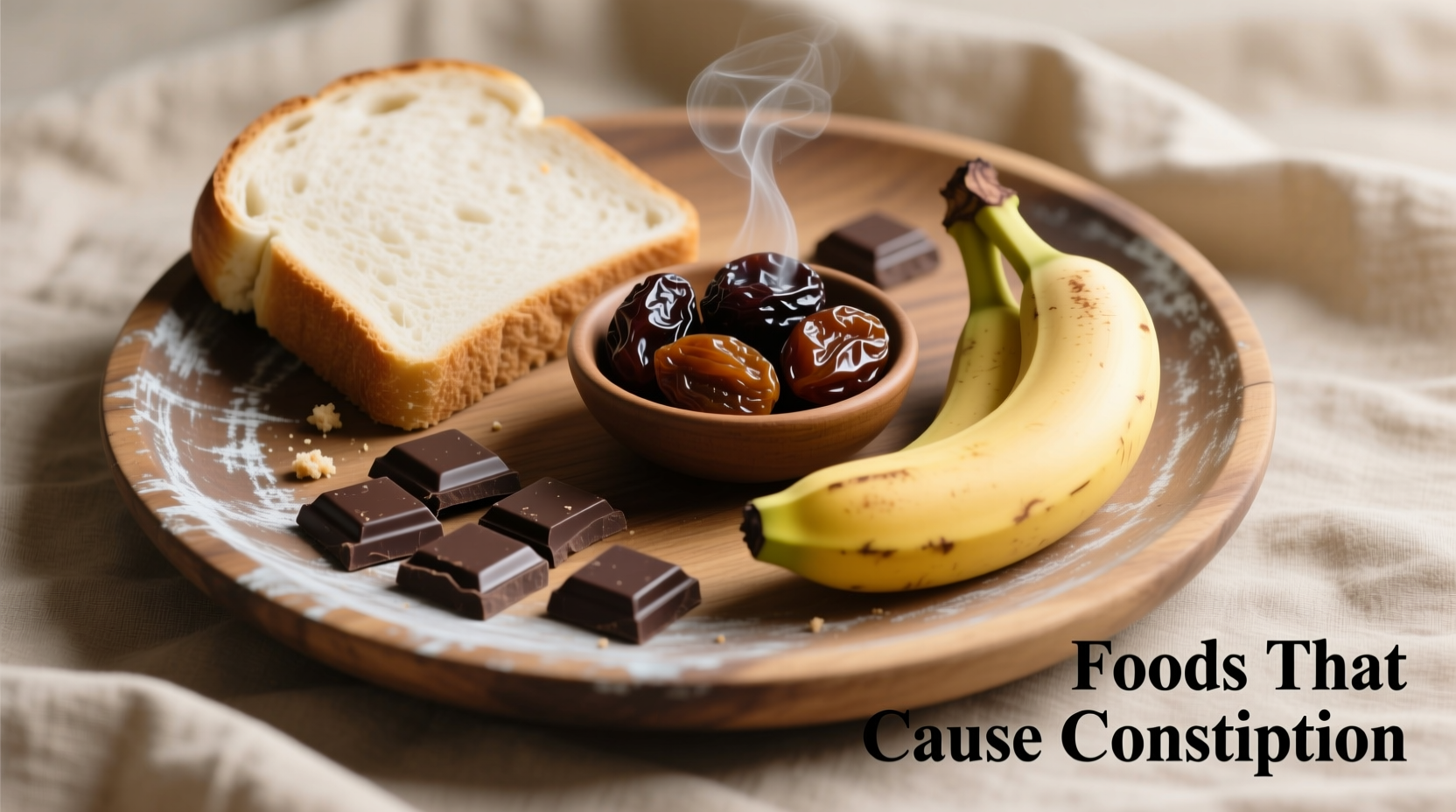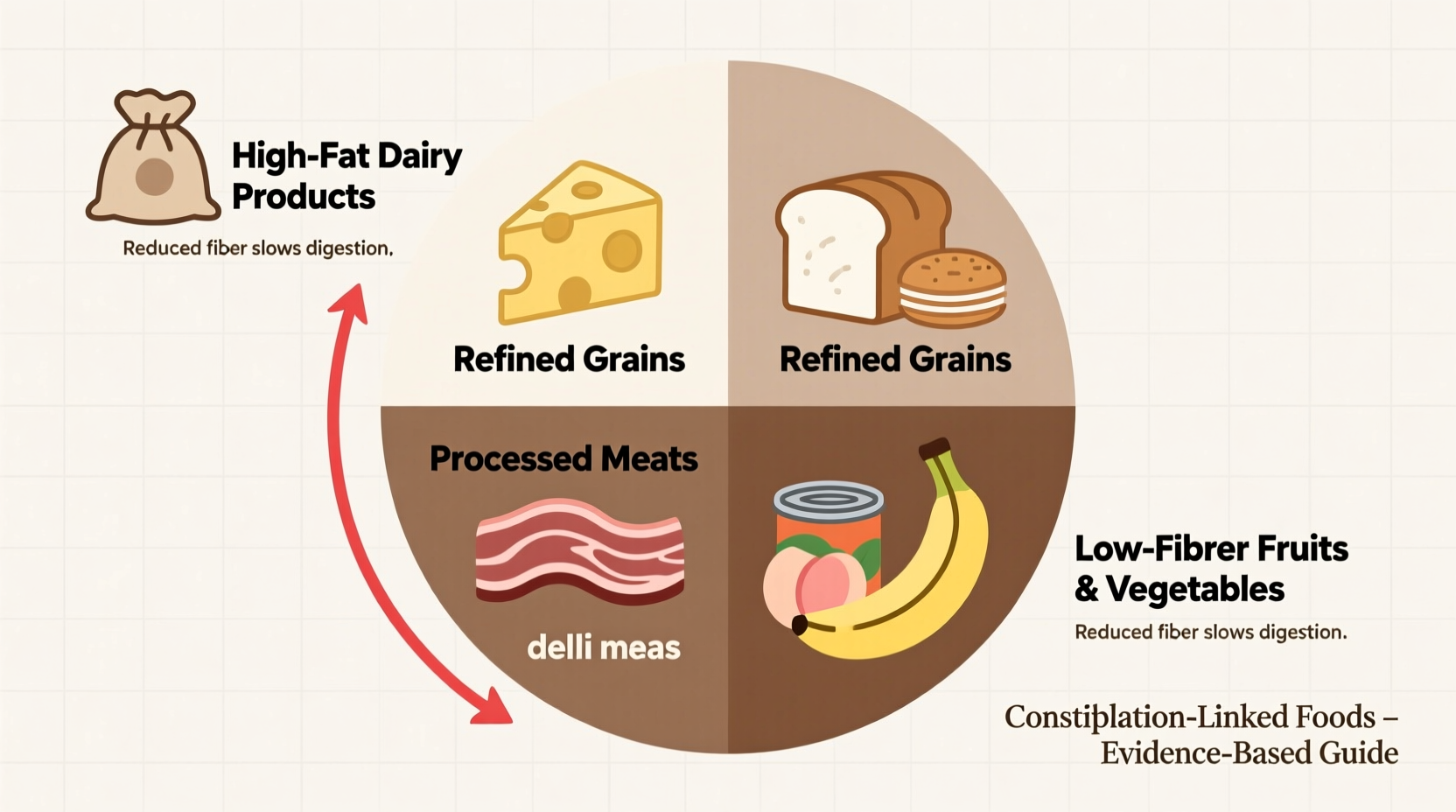Low-fiber processed foods, excessive dairy products, unripe bananas, and fried foods are the primary dietary culprits behind constipation. These items slow digestion by reducing intestinal movement, absorbing water from stool, or lacking the fiber needed for proper bowel function. Understanding which foods contribute to constipation helps you make informed dietary choices for better digestive health.
Why Certain Foods Trigger Constipation: The Digestive Science
Constipation occurs when stool moves too slowly through your digestive tract, becoming hard and difficult to pass. Your digestive system relies on a delicate balance of fiber, fluids, and muscle contractions. When you consume foods low in fiber or high in certain compounds, this balance gets disrupted. Fiber adds bulk to stool and helps it retain water, making it easier to pass. Without sufficient fiber, your colon absorbs more water from waste, creating hard, dry stools that move sluggishly.
According to the National Institute of Diabetes and Digestive and Kidney Diseases, constipation affects approximately 16% of adults and 33% of adults over 60. While multiple factors contribute, dietary choices represent one of the most controllable elements in maintaining regular bowel movements.

Top 5 Food Categories That Cause Constipation
1. Processed and Refined Carbohydrates
White bread, pastries, cookies, and other processed foods made with refined flour lack the fiber found in whole grains. When manufacturers remove the bran and germ from grains, they strip away essential fiber that keeps your digestive system moving efficiently.
| Food Item | Fiber Content (per serving) | Constipation Risk Level |
|---|---|---|
| White bread (2 slices) | 1.9g | High |
| Whole wheat bread (2 slices) | 4.0g | Low |
| White rice (1 cup) | 0.6g | High |
| Brown rice (1 cup) | 3.5g | Low |
Research published in the World Journal of Gastroenterology confirms that populations consuming predominantly refined grains experience significantly higher rates of constipation compared to those eating whole grains. The dramatic difference in fiber content explains why swapping refined carbohydrates for whole grain alternatives often resolves mild constipation.
2. Excessive Dairy Products
Milk, cheese, and other dairy products can cause constipation in certain individuals, particularly those with lactose intolerance or casein sensitivity. The protein in dairy (casein) can slow intestinal movement, while the calcium content may bind with other compounds to form harder stools.
A clinical review in the Journal of Pediatric Gastroenterology and Nutrition found that 30% of children with chronic constipation showed improvement after eliminating dairy from their diets. While adults may be less susceptible, those with undiagnosed lactose intolerance often experience constipation as a primary symptom alongside bloating and discomfort.
3. Unripe Bananas
While ripe bananas support digestion, unripe (green) bananas contain high levels of resistant starch and tannins that can actually cause constipation. The starch hasn't converted to sugar yet, making it harder to digest, while tannins slow intestinal movement.
According to research from the Harvard T.H. Chan School of Public Health, the ripening process transforms bananas from constipating to constipation-relieving. As bananas ripen, starch converts to simple sugars and resistant starch decreases, making them easier to digest and actually helpful for diarrhea.
4. Fried and High-Fat Foods
Burgers, fries, and other fried foods slow digestion because fat takes longer to process than carbohydrates or protein. When your stomach works harder to break down fatty foods, it signals your intestines to slow down too, creating a traffic jam in your digestive tract.
The Mayo Clinic identifies high-fat diets as a common dietary cause of constipation. Their research shows that meals containing more than 40 grams of fat can delay gastric emptying by up to 50%, significantly slowing the entire digestive process.
5. Red Meat in Excess
While protein itself doesn't cause constipation, consuming large amounts of red meat without sufficient fiber creates an imbalance in your digestive system. Meat contains no fiber, and its high protein content requires more water for digestion, potentially leaving less moisture for proper stool formation.
A longitudinal study tracking dietary patterns found that individuals consuming more than 500g of red meat weekly were 24% more likely to report constipation than those limiting red meat to 300g or less. The key isn't eliminating meat entirely but balancing it with adequate fiber and hydration.
Individual Factors That Influence Food-Induced Constipation
Not everyone experiences constipation from these foods. Your personal risk depends on several factors:
- Hydration levels: Low water intake combined with constipating foods dramatically increases risk
- Overall diet pattern: Isolated consumption matters less than your total daily fiber intake
- Physical activity: Sedentary lifestyles compound dietary constipation risks
- Genetic factors: Some people naturally have slower digestive transit times
- Medication interactions: Certain drugs like opioids amplify constipation effects
Understanding these context boundaries helps explain why your friend might eat cheese daily without issues while you experience discomfort after just a small serving. The American Journal of Clinical Nutrition reports that individual tolerance varies widely, with some people tolerating moderate amounts of typically constipating foods without problems when their overall diet supports digestive health.
Practical Steps to Prevent Food-Related Constipation
Instead of completely eliminating potentially problematic foods, implement these evidence-based strategies:
- Balance fiber intake: Aim for 25-38g daily from diverse sources like vegetables, fruits, legumes, and whole grains
- Hydrate strategically: Drink 1.5-2 liters of water daily, increasing when consuming higher-fiber foods
- Time your food consumption: Avoid eating large portions of constipating foods at once; space them throughout the day
- Pair wisely: Combine moderate dairy with high-fiber foods to offset potential constipation effects
- Monitor your body: Keep a food diary to identify your personal triggers
When to Consult a Healthcare Professional
While dietary changes often resolve constipation, seek medical advice if you experience:
- Constipation lasting more than three weeks despite dietary changes
- Severe abdominal pain accompanying bowel changes
- Blood in your stool
- Unexplained weight loss with digestive issues
- Constipation alternating with diarrhea
Persistent constipation could indicate underlying conditions like irritable bowel syndrome, hypothyroidism, or neurological disorders that require professional diagnosis and treatment.











 浙公网安备
33010002000092号
浙公网安备
33010002000092号 浙B2-20120091-4
浙B2-20120091-4